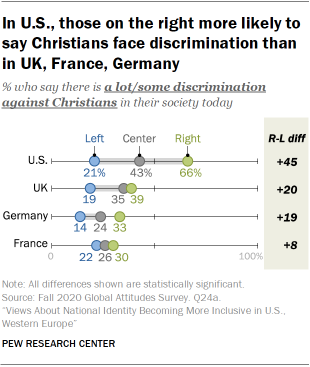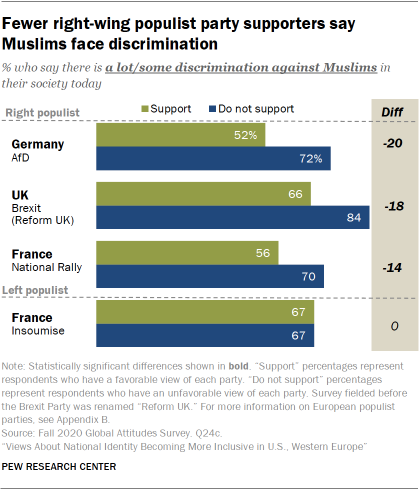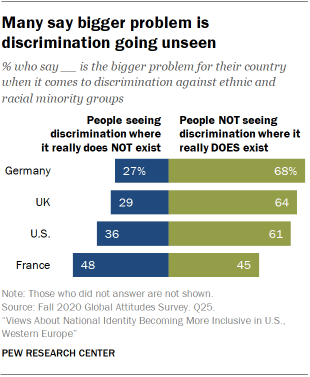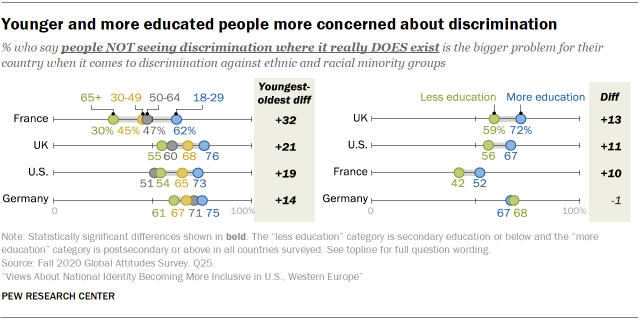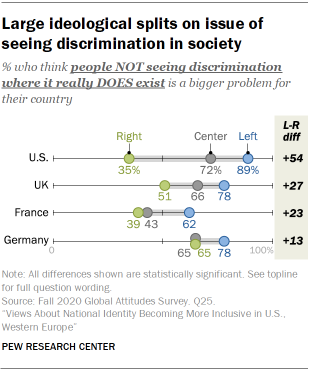About eight-in-ten Americans say there is a lot or some discrimination against Muslims in their society, and two-thirds or more in the UK, Germany and France agree.
In every country but Germany, significantly more say there is discrimination against Muslims than say the same of Jews. In Germany, 64% say Jews are discriminated against – and similar numbers of Americans (66%) say the same. Fewer Britons (58%) and French (50%) agree.
The share who believe there is discrimination against Christians in their society is lower across all four countries than the share who say the same of Jews or Muslims. Still, Americans stand out: 47% see a lot or some discrimination against Christians.3 In the UK, France and Germany, no more than about three-in-ten say the same. In Germany, about half (49%) say there is no discrimination at all against Christians in their society.
Outside of Germany, those who are Christian are more likely to perceive discrimination against people of their faith than those who are not.4 In the U.S., for example, 56% of Christians say there is at least some discrimination against Christians, compared with 30% of non-Christians. The gap is a smaller 15 percentage points in the UK and 11 percentage points in France.
Ideology is related to views of discrimination against Christians in every country surveyed. In the U.S., the UK and Germany, those who place themselves on the right of the ideological spectrum are more likely than those on the left to say there is discrimination against Christians. This divide is particularly wide in the U.S., where about two-thirds (66%) of those on the right say Christians face discrimination, compared with just 21% of those on the left.
Such ideological differences are reflected in the differences between those with favorable and unfavorable views of right-wing populist parties. In the UK, those with favorable views of the Brexit Party (Reform UK) are significantly more likely to say there is a lot or some discrimination against Christians in society. In France, 37% of National Rally supporters say Christians are discriminated against compared to 23% of those with an unfavorable view of National Rally. In contrast, supporters of the left-wing populist party La France Insoumise are less likely to say there is discrimination against Christians in society.
British focus group participants highlighted discrimination against Christians
During focus groups conducted in the UK, several right-leaning groups brought up what they perceived to be the decline or “erasure” of Christian traditions to accommodate other religions. People cited the removal of “Christmas” from holiday greetings or an event name, such as school concerts for children that were rebranded as “winter” events. They argued that these traditions were changing so as not to cause offense to those who practice other religions but, in so doing, were harming Christians and their traditions. Most often, the changing nature of traditionally Christian events was contrasted with Islam and Islamic traditions.
“At my children’s school, we had to change the name of everything from being Christmassy because it wasn’t multicultural enough, and I think that’s just bizarre. Because you wouldn’t rename other religious festivals and give them a different name to make them sound more English or British. You know we had the Christmas fair, we had the Christmas concert, the Christmas dinner and that all had to be Winter.”
– Woman, 41, London, Right Remainer
In contrast, supporters of the three right-wing populist parties asked about on the survey are less likely than nonsupporters to say there is a lot or some discrimination against Muslims in their society.
This difference is widest in Germany, where 52% of those with a favorable view of the right-wing Alternative for Germany (AfD) believe there is discrimination against Muslims, compared with 72% of those with an unfavorable view of the party. Double-digit differences are present between supporters and nonsupporters of the other two right-wing parties: UK’s Brexit Party (Reform UK) and France’s National Rally. Equal shares of those who support the French left-wing populist party La France Insoumise say there is discrimination against Muslims in their society.
In the U.S., Republicans and Republican-leaning independents are more likely than their Democratic counterparts to say there is discrimination against Christians (62% vs. 32%, respectively). In contrast, Democrats are more likely than Republicans to say Jews and Muslims face discrimination. For example, 62% of Democrats say there is a lot of discrimination against Muslims in their society, compared with just 23% Republicans.
Many think discrimination going unseen is a bigger problem for their country
Majorities in Germany, the UK and the U.S. think that when it comes to discrimination against ethnic and racial minorities, people not seeing discrimination where it really does exist is a bigger problem for their country than people seeing it where it does not exist. Six-in-ten or more hold this view in all three countries, including 68% of Germans. French people are divided, with about equal shares professing each opinion.
Views differ widely by age, with people ages 18 to 29 significantly more likely than those 65 or older to think discrimination against ethnic and racial minority groups going unseen is a bigger problem for their country. Such double-digit age gaps appear in each country surveyed, with the largest gap appearing in France (32 percentage points).
Small educational gaps exist in every country but Germany. For example, 72% of Britons with a postsecondary education or higher say the bigger problem is people not seeing discrimination where it really does exist, 13 points higher than those with a secondary education or less (59%).
Again, these opinions are colored by ideology in every country surveyed. Those on the ideological left are significantly more likely to think discrimination going unseen is a bigger problem for their country than those on the right.
The ideological gap is largest in the U.S., with 89% of those on the left stressing that it’s a bigger problem that people do not see discrimination where it does exist and only 35% of those on the right agreeing.
In France, those with a favorable view of the left-wing populist party La France Insoumise are more likely than those with an unfavorable view of the party to say the bigger problem for their country is discrimination going unseen. In contrast, those with a favorable view of the right-wing populist parties AfD and the Brexit Party (Reform UK) are more likely to say the bigger problem is people seeing discrimination where it really does not exist.

